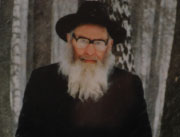Sacrifice and Joy


“Most of my knowledge and hashkafah come from what my father taught me from a very early age. And he did it very cleverly. He’d give me an explanation and say ‘Okay enough you can go now.’ When I was older he taught me why. ‘Never overwhelm someone with an answer and make sure they will want to come back and hear more.’
I t’s a warm day in May the sun hugging my shoulders when I pick up Rebbetzin Kuperman from the hotel where she’s staying for her week in Vienna.
The Rebbetzin wishes to discover the city and its sites. “Especially the Jewish parts” she tells me with her characteristic enthusiasm “since I know that Jews have played a long and crucial role in this country.”
As we walk and talk the Rebbetzin is fascinated by each sight. Walking through the rooms of the palace of Emperor Franz Joseph she recalls a similar tour her father took in a palace in St. Petersburg. “My father did things no one else dared.” She laughs. “When he saw the throne he waited until no one was watching and sat down for just a second. Just so that he could say ‘I sat on the throne of the once-invincible mighty Russian powers!’ ”
Family Focus
Astoundingly Rebbetzin Kuperman grew up ignorant of her illustrious family. “The first time I heard that my grandfather had been a rav was when I was 30 years old living in Eretz Yisrael” the Rebbetzin reveals. “I heard a Yid from Kazan referring to ‘the son of the rav ’ and didn’t understand that he meant my father.”
Back in Kazan her father was a mathematician at the university and the son of the town rav. But having fled to Tashkent where Rebbetzin Kuperman was born Rav Zilber never spoke of it.
“My parents had one objective ” the Rebbetzin says “to make our childhood a happy one no matter the circumstances.” She didn’t attend kindergarten as her parents were afraid that she’d unwittingly eat treif and she only started school at the age of eight. “There was a very strong chinuch reason for this ” she explains. “Being older than my class meant I no longer had the pressure to feel equal to my peers. I could resist following the crowd.”

“My father understood me and knew to give me space” she recalls. “He always taught me in such a way that things would go to the depths of my heart and not just to my intellect”
Keeping a child home and occupied was no easy feat. Yet not only did her mother keep Chava busy she ensured that her young daughter’s day was steeped with Jewish lessons and educational experiences. To help her mother looked for a house with a yard so that the children had space to run around and play. Unable to afford a nice home with a garden or yard they resorted to renting a shack that had the luxury of a courtyard.
“It was more of a garden house than a family home ” recalls the Rebbetzin. “We had no plumbing no running water no electricity or even basic furniture! I shared a bed with my sister and my brother slept on a camping cot.” It wasn’t until she arrived in Eretz Yisrael that Chava got to sleep in a bed of her own.
Young Chava loved imitating her parents whether by shaping challos from Play-Doh or following her father on Leil Shabbos as he walked back and forth with his hands in the air reciting Ribbon Kol Olamim. When at the age of five she wished to join him in making Kiddush her father indulged her.
“Years later my father admitted to me that my Kiddush had a tremendous impact ” she shares. “Back then the shul used to be in our house. On Friday nights some of the men would join our family seudah after davening. When they saw a young child making Kiddush in Russia the country that had forgotten Hashem they were moved to tears. In those days only old people did such things.”
When as a girl of six Chava asked to learn Chumash Rav Zilber paid the father of her friend to teach her. They managed to learn all of Bereishis and part of Shemos. “My mother would walk me to and from their house every single day — you wish to learn we will provide it!”
When Chava finally entered first grade her mother chose a school where the teacher was Jewish. Although her mother paid the teacher not to note her daughter’s absence on Shabbos the Rebbetzin avers that the teacher only agreed because of her Jewish soul. After all “no money in the world was enough for someone to take such a risk.” (Excerpted from Family First Issue 561)
Oops! We could not locate your form.







